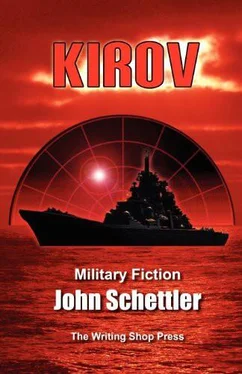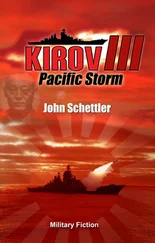John Schettler - Kirov
Здесь есть возможность читать онлайн «John Schettler - Kirov» весь текст электронной книги совершенно бесплатно (целиком полную версию без сокращений). В некоторых случаях можно слушать аудио, скачать через торрент в формате fb2 и присутствует краткое содержание. Жанр: Фантастика и фэнтези, Альтернативная история, на английском языке. Описание произведения, (предисловие) а так же отзывы посетителей доступны на портале библиотеки ЛибКат.
- Название:Kirov
- Автор:
- Жанр:
- Год:неизвестен
- ISBN:нет данных
- Рейтинг книги:5 / 5. Голосов: 1
-
Избранное:Добавить в избранное
- Отзывы:
-
Ваша оценка:
- 100
- 1
- 2
- 3
- 4
- 5
Kirov: краткое содержание, описание и аннотация
Предлагаем к чтению аннотацию, описание, краткое содержание или предисловие (зависит от того, что написал сам автор книги «Kirov»). Если вы не нашли необходимую информацию о книге — напишите в комментариях, мы постараемся отыскать её.
Kirov — читать онлайн бесплатно полную книгу (весь текст) целиком
Ниже представлен текст книги, разбитый по страницам. Система сохранения места последней прочитанной страницы, позволяет с удобством читать онлайн бесплатно книгу «Kirov», без необходимости каждый раз заново искать на чём Вы остановились. Поставьте закладку, и сможете в любой момент перейти на страницу, на которой закончили чтение.
Интервал:
Закладка:
“Sir, the initial group targeted by our Moskit-II barrage has slowed to a speed of ten knots, all other contact groups still advancing at high speed.”
“Very well…” Karpov gave Orlov one final look, but his chief said nothing. “Mister Samsonov, on my order, and seconded by the order of acting Executive Officer Orlov, I now authorize the use of nuclear weapons and instruct you to target the American task force at position number two on your screen. Ignore the destroyers. I want to strike their main battle fleet. You will launch the MOS-III number ten missile on my command.”
Samsonov leaned in over his screen, noting the surface action group contact positions clearly labeled one through four, and selecting group number two. “Sir, weapon ready and targeted. Awaiting second confirming order to authorize fire.” Samsonov looked warily at Orlov, seeing the Chief nod his head.
Orlov hesitated, ever so slightly. He had not counted on this. It was down to him now. If he failed to second the Captain’s order, Samsonov would not fire. What would Karpov do then? One look at Karpov’s face told him the Captain knew this moment was coming; knew it would be Orlov’s choice that would set the missile in motion. Was he being set up for the fall?
“Orlov?” Karpov pressed him, his eyes widening with the tension of the moment.
“Very well…” said Orlov in a low voice. “I second the Captain’s order.”
At that moment the ship’s intercom crackled alive and Doctor Zolkin began speaking to the crew.
“Fire.” The Captain spoke the word in a calm, level voice. There was no emotion in it, no regret or reluctance, and yet no hint of bravado either. And the word became an order; the order became a reflex; the reflex became a signal; the signal became a missile; the missile became death.
Chapter 32
Zero Hour
Admiral Volsky hastened down the narrow gangway with Fedorov in his wake, and as he passed through work spaces crewmen smiled to see him up and about again, then stood stiffly to attention, their arms snapping up in salute. He passed with a brief salute and “as you were,” his face set and determined. Fedorov was quick to engineering and three men came with an acetylene torch to easily cut off the padlock and set the Admiral free.
Seconds later the claxon alarm for battle stations jangled over the intercoms into every deck of the ship. A deep horn blared, and Volsky knew what would follow, the rush of missiles being ejected from their vertical launch tubes followed by the roar of the rocket engines igniting to propel the lethal darts on their way. Karpov was at war again on the bridge, and the Admiral quickened his pace, his breath coming fast as he climbed the narrow ladder up to the bridge citadel. Reaching the top he was surprised to see the hatch closed and sealed, a watchman posted there.
“What is this? Stand aside, mishman.”
The man stood to attention, saluting.
“Open that hatch!” The Admiral’s order was sharp and pointed.
“Sir, the emergency watertight seals have been set from inside the citadel. I cannot open the hatch, sir.”
Volsky’s eyes flashed, and he immediately thumbed the intercom on the wall. “This is Admiral Volsky, I am standing outside the main hatch. Release the watertight seals and clear this hatch at once.”
The roar of two more rockets firing split the air. Volsky repeated his command, yet there was no answer from within. “What are they deaf in there? This is Admiral Volsky. Open this hatch!”
The wash of static was his only response, and the Admiral quickly surmised what was happening. Karpov had disabled the intercom here as well. The Captain had ordered emergency protocols and sealed off his bridge. If they would not hear his command via the intercom, and the external hatches were most likely sealed off as well. There was only one choice for him now.
“Those fools,” he said. “You,” he pressed a finger into the mishman’s chest. “Come with me.” The Admiral started down the ladder, his heavy soled shoes thudding on the steps with each hurried footfall. The mishman came behind him, a worried, anxious look on his face when he looked at Fedorov at the bottom. He did not understand what was happening, but orders were orders and this was the Admiral, so he followed.
Two decks below Volsky heard Karpov’s voice on the ships intercom. “All hands, all hands. This is Captain Karpov speaking. I must inform you Admiral Volsky remains incapacitated, and I have assumed full command of this ship. Stand to action stations! Emergency protocols are now in force. We are engaging a large surface action group of enemy vessels. The enemy is closing on our position and I will defend this ship. I expect every man to do his duty. That is all.”
“Incapacitated?” Volsky shook his head, his anger building as he hurried along as fast as his thick legs would carry him down passageway. Pushing through a wardroom he looked quickly at the men there, seeing them up and fetching their heavy coats and life preservers. He quickly matched faces to skill sets in his mind. “Velichko, Gromenko, Kalinichev-follow me. Kosovich, go to the Marine Quarters and tell Sergeant Troyak to come to the aft citadel with a rifle squad.”
Volsky was collecting officers and heading for the aft citadel, a secondary bridge below decks, sometimes called the “battle bridge,” that would serve as an auxiliary command center for the ship in the event the main bridge was damaged or otherwise out of action. It had control stations for every main element of the ship, including a combat information center, helm station, communications, radar and sonar; and it was also protected by an armored shell of 200mm Kevlar coated hardened steel armor, just as the main bridge. It was even served by the Tin Man optical sighting equipment mounted on the forward watch decks. Signals and HD video from the devices would feed directly to the aft battle bridge as well.
The men were shocked to see the Admiral, yet pleased. They were up and in his wake immediately, and along the way the Admiral collared Fedorov and gave him an another order. “Go to the sick bay again and fetch the doctor with his medical bag,” he said. “Then come to the aft citadel as soon as possible.” To Velichko he said: “You go and tell Chief Engineer Dobrynin to report to me at once. Then get Chief Martinov in ordinance as well. I want them both. Quickly now!”
They pressed on through narrow passages, the red combat lighting casting a ruddy hue on the lime green walls and thick bundled cables that carried the pulse of all the electronics on the ship, connecting radars, computers, control consoles. Volsky had counted four missile launches and two more roared away just as stepped up through the last hatch to the outer deck of the battle bridge. He looked up, surprised. There stood Sergeant Troyak and a squad of armed marines.
112 miles or 180 kilometers to the south, the American Task Force 16 had run far enough. Some time ago, the group had slowed to make a graceful wide turn, coming about to face the pursuing enemy with all hands at battle stations. The four transports had long since taken on the wounded and other survivors of TF-1, and hurried on south, escorted by two destroyers. The rest of the force reformed around the TF flagship captained by Jerauld Wright on the old battleship Mississippi.
Once she had been called a super-dreadnought, “a great modern battleship,” or so read the notation in Popular Mechanics in 1936. The battleship was commissioned in 1917, the largest ship in the navy at the time at 32,000 tons, and hailed as “one of the world’s mightiest ships.” Many before her had made that same claim, the mighty Hood, the mighty Bismarck, and many after her would do so as well.
Читать дальшеИнтервал:
Закладка:
Похожие книги на «Kirov»
Представляем Вашему вниманию похожие книги на «Kirov» списком для выбора. Мы отобрали схожую по названию и смыслу литературу в надежде предоставить читателям больше вариантов отыскать новые, интересные, ещё непрочитанные произведения.
Обсуждение, отзывы о книге «Kirov» и просто собственные мнения читателей. Оставьте ваши комментарии, напишите, что Вы думаете о произведении, его смысле или главных героях. Укажите что конкретно понравилось, а что нет, и почему Вы так считаете.












